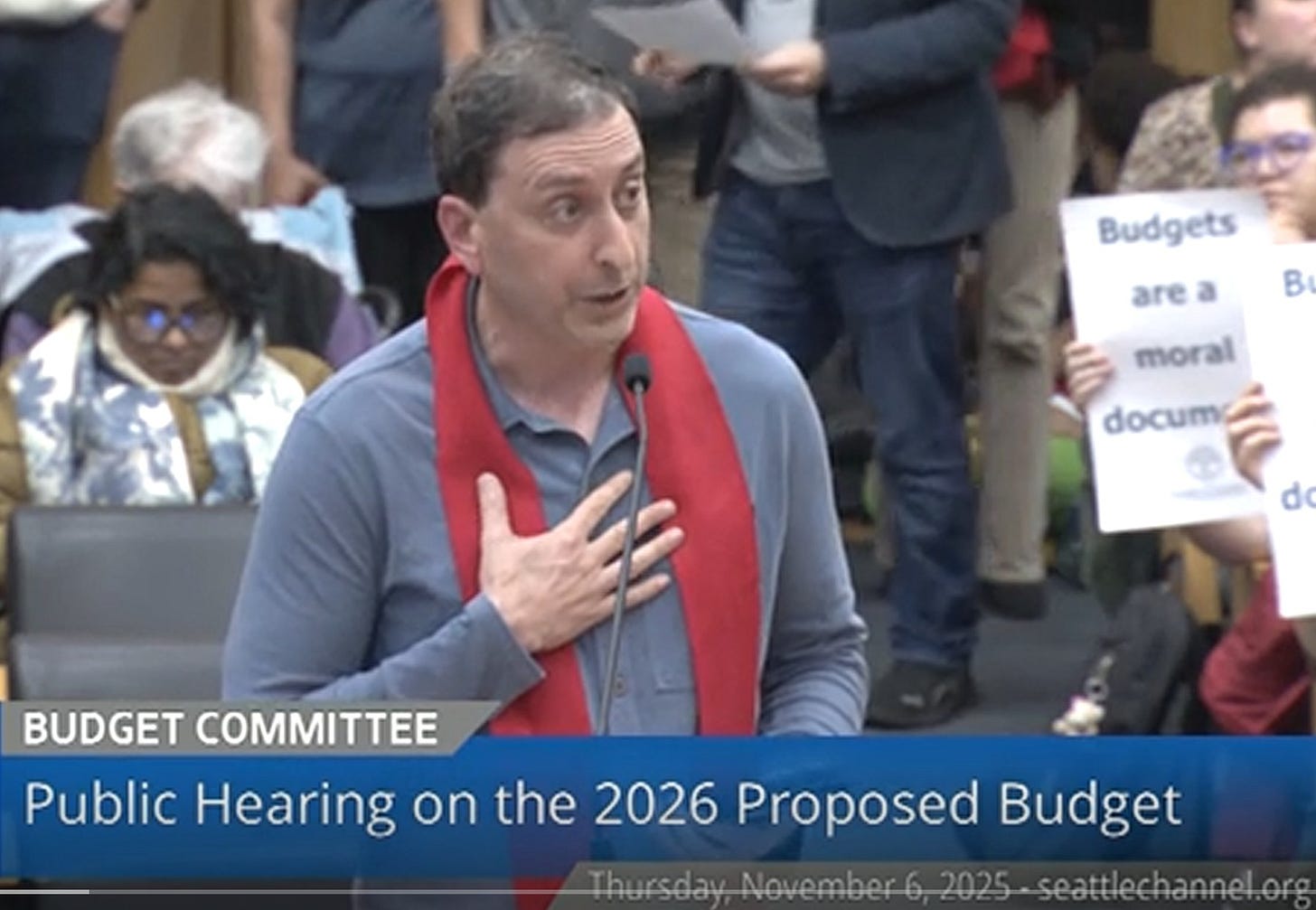"Without Shelter, People Die"
...239 days to go...
Last week I had my first opportunity to present to the Seattle City Council at their Budget Committee public hearing.
I was there to ask Seattle and King County to allocate $36 million to backfill federal funds historically used for permanent supportive housing and rapid re-housing. The Department of Housing and Urban Development (HUD) is planning to reallocate these funds, and without local action, hundreds or thousands of our precariously housed neighbors will be kicked to the streets.
If you’re so inclined, you can watch my appeal here (I appear at exactly 20:00 for about 90 seconds).
The hearing lasted over five and a half hours, with more than 200 individuals testifying before the council. In addition to my own, I found a few other topics particularly moving:
Tent Cities Face Displacement
Tent City 3 and Tent City 4—two tent cities, one in Ravenna and one in Lake City—will both be forced to move this Saturday when their leases with the city expire. Neither has a place to go.
The most likely outcome, if the mayor and city council don’t take action, is that these communities will scatter, losing connections to their fellow residents, schools for their children, and relationships with their caseworkers. Since many individuals lack both cell phones and permanent addresses, it’s very common in these types of moves for case managers to lose people entirely they have been working to house for months, forcing individuals to start over from scratch.
One resident who spoke has five children. She spoke passionately about how painful it would be to be uprooted and force her children to attend a new school. Another resident brought her service dog to the meeting, testifying about how Tent City 4 was the only safe place for her to go. Since she’s disabled, she said she wouldn’t last long on the street and concluded, “I hope ya’ll see the value in our lives.”
The Violence of Sweeps
Many speakers, including a number of pastors and other faith-based leaders, talked about the contradictions inherent in funding both affordable housing and encampment sweeps. They described them as “violent and dehumanizing sweeps for our unhoused neighbors which don’t help and only harm, and allow us to pretend that our unhoused neighbors don’t exist.”
I was struck by the poise of one high school senior from Lincoln on this topic. She had gathered 200 letters from her peers and carried them in a folder she brought to the dais. She said the city needs affordable housing so they will have a place to live when they graduate from high school. In one month, she’ll be a voter.
Legal Support for Tenants
Several speakers asked for additional funding for the Housing Justice Project, an organization which provides free legal representation for tenants during the eviction process. It’s very hard for tenants without a lawyer to properly make their cases against landlords who are almost always represented by counsel.
My wife, Jen, volunteered for HJP a few years ago, and I believe it might be one of the most cost-effective ways to keep people in their homes and help them avoid homelessness. However, at least according to one speaker, 600-800 new eviction lawsuits are filed monthly in Seattle and HJP has the resources to represent only 33 of these.
A Positive Experience Overall
In general, it was a very positive experience. Attendance was pretty good: seven of the nine councilmembers were present (only Debora Juarez and Maritza Rivera were missing). It would be hard to accuse the council of being impatient—between two sessions that day they heard over 200 individuals over more than five and a half hours of testimony.
However, the true impact will be measured in whether these priorities are addressed. As the budget is finalized this month, I’ll be watching to see:
Whether Seattle is able to find homes for Tent City 3 and Tent City 4
Whether we increase or decrease the budget for encampment sweeps
Whether we increase or decrease the funding for the Housing Justice Project
Whether the council allocates funds to backfill federal funds for permanent supportive housing and rapid re-housing which are drying up
The title of this post comes from a simple truth spoken by multiple speakers that night: without shelter, people die. Especially as winter approaches, the decisions our council makes in the coming weeks will quite literally determine whether some of our neighbors survive until spring.
I’m grateful I had the chance to speak up for them. Now we wait to see if the council was listening.



Excellent presentation, Alex! Keep us all posted on the outcome.